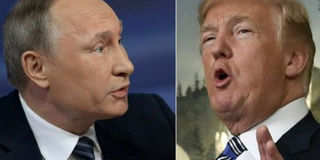Big powers set to clash at chemical weapons watchdog

The United States meanwhile said earlier this month that it was preparing more sanctions against Moscow over the Salisbury attack, which Britain says involved Novichok, a Soviet-era nerve agent. AFP PHOTOS
What you need to know:
- The Salisbury attack that left Skripal and his daughter critically ill -- while left-over nerve agent left a British woman dead -- has added to the pressure for such powers.
- Britain has blamed the attack on two members of Russia's GRU military intelligence agency -- the same agency blamed by The Netherlands for the OPCW hacking attempt in April.
Major powers are set to clash Monday at the global toxic arms watchdog over a Russian spy scandal and a new ability to attribute blame.
The meeting of the Organisation for the Prohibition of Chemical Weapons in The Hague is the first since member states agreed in June to let it point the finger over attacks.
Russia opposes the new powers, which will see the OPCW start apportioning responsibility for chemical incidents in Moscow's ally Syria early next year.
The meeting is also the first since the expulsion of four Russians accused by Dutch authorities in October of trying to hack into the watchdog's computer system, using electronic equipment hidden in a car parked outside a nearby hotel.
At the time the organisation was investigating a nerve agent attack on Russian former double agent Sergei Skripal in the British city of Salisbury, and a major chemical attack in Syria.
"This will be a rather heated debate," Russia's envoy to the OPCW Alexander Shulgin was quoted as saying by the TASS news agency.
The ambassador said the new powers run "counter to the chemical convention’s provision", adding that many states also oppose plans to increase the watchdog's budget.
Russia has previously warned that the new powers make the OPCW a "sinking Titanic" and has hinted at pulling out.
The United States meanwhile said earlier this month that it was preparing more sanctions against Moscow over the Salisbury attack, which Britain says involved Novichok, a Soviet-era nerve agent.
'Difficult moment'
The OPCW says the two-week meeting of the 193 member countries is meant to "discuss the future of the organisation".
But new OPCW director-general Fernando Arias, who will give the opening address on Monday, admitted in an interview last week that it was "going through a difficult moment".
Former Spanish diplomat Arias, who took over as chief earlier this year, insisted however that the toxic arms body was "more needed than ever".
Winner of the Nobel Peace Prize in 2013, the OPCW is responsible for upholding the 1997 Chemical Weapons Convention to end the use of all toxic arms.
So far it says it has overseen the destruction of 96.5 percent of the world's chemical arms stocks.
'Very strong team'
But in recent years it has seen its role expand to cover the investigation of a wave of chemicals attacks in the Syrian civil war, as well as the March 2018 Salisbury attack and the 2017 killing in Malaysia of a half-brother of North Korean leader Kim Jong Un.
Top of the agenda this week will be discussions on how to implement the new powers that member states agreed on at a special meeting in June to let the OPCW attribute blame for attacks.
A "very small but very strong" investigative team will start work early next year with a mandate to go back and try to point the finger for all chemical attacks in Syria since 2013, Arias said.
The OPCW is due soon to release a full report on a chemical attack in the Syrian town of Douma in April. An interim report said chlorine was detected but not nerve agents.
The watchdog will also be able to attribute blame for future attacks anywhere in the world, so long as it is asked to by the country on whose territory where the incident happened.
The Salisbury attack that left Skripal and his daughter critically ill -- while left-over nerve agent left a British woman dead -- has added to the pressure for such powers.
Britain has blamed the attack on two members of Russia's GRU military intelligence agency -- the same agency blamed by The Netherlands for the OPCW hacking attempt in April.
"Salisbury means for us we have to adapt to the new risks and challenges," Arias said.




